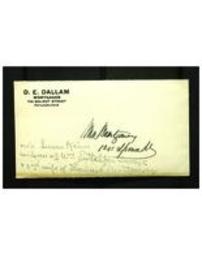About This Collection
The diary of Chester County travels undertaken by Thomas L. Montgomery (the “Dragon”), John Thomson (“St. George”), Edward J. Nolan (“General Wheeler”), and Clarence Kates (the “Cherub”) consists of 79 scanned pages and dates from July 8-15, 1899. In the journal, the men refer to themselves by the nicknames indicated in the parentheses above. Thomas Lynch Montgomery (1862-1929) was a librarian. He was born and raised in Philadelphia, Pennsylvania, and his parents were Catherine Gertrude Lynch and Oswald Montgomery. He graduated from the University of Pennsylvania in 1884 and worked as librarian at the Wagner Free Institute of Science prior to his 1903 appointment as State Librarian. After retiring from that position, he became the librarian and corresponding secretary of the Historical Society of Pennsylvania. He also served as a trustee of the Free Library of Philadelphia. His first wife was Brinca Gilpin; after her death he married Susan Kelm Savage, the widow of William Lyttleton Savage. He was a member of St. Mark’s Episcopal Church, and in 1899, the Montgomery family either owned or rented a farm in Green Hill, Chester County. John Thomson (1835-1916) was also a librarian. He was born in England in 1835 and married Mary Ann Faulkner, a poet and hymn writer. They had a number of children and immigrated to the United States around 1881. He was the private librarian for Jay Gould (railroad magnate and financier in New York City) and for Clarence H. Clark (banker and property developer in Philadelphia), and he produced printed bibliographies of the libraries of both these men. Thomson then became head librarian of the Free Library of Philadelphia and oversaw the opening of its first branch at the Wagner Free Institute, where Thomas L. Montgomery also worked. Edward James Nolan (1846-1921) was a physician and librarian. His parents were from Ireland, and he was born in either Ireland or New York, as indicated in different census records. In 1862, he became library assistant at the Academy of Natural Sciences in Philadelphia, but then studied medicine at the University of Pennsylvania. In 1867, he returned to the Academy as librarian and remained there until his death in 1921. In 1909, his history of the Academy was published and the diaries of his European travels were reported to be held by the American Catholic Historical Society. Clarence Sears Kates (1870-1922) was born in Philadelphia, the son of Julia May Smith and Horace Nicklen Kates. After graduating from Episcopal Academy and the University of Pennsylvania (1889), Kates married Mary Avil, and they had two sons. Kates had an interest in farming/agricultural enterprises and forestry, and he was a friend of forester Gifford Pinchot. He was a member of a number of organizations, including the Pennsylvania State Grange, the Rural Progress Association of Pennsylvania, Chester County Farmers Club, the American Academy of Political and Social Science, the Corn Exchange National Bank, the University Club, the Undine Barge Club (one of Philadelphia’s rowing clubs), and the Philobiblian Club (a group of book lovers). In the early 1900s, Clarence Kates purchased the old Coxe farm in Glen Loch, West Whiteland Township, Chester County, and there worked to establish a model farm. He named the property Swedesford Manor and remodeled the old house to resemble Haddon Hall, a distinguished house in England. He joined the local St. Paul’s Episcopal Church. After the Reverend Charles Wesley Shreiner established the Church Farm School for boys on an abandoned farm in Glen Loch, Kates, a trustee of the school, worked with the students to clear the land. After Kates’ death in 1922, his farm was rented by the school. The travel diary begins with the men meeting at Dr. Montgomery’s Glenwood Farm, in Green Hill, north of West Chester. Along the way, some observations are made about landscape and plants, and places where they ate or lodged. However, much of the diary is used to record snippets of their discussions. They also document fantastical tales about some of the people they meet. For example, a beautiful waitress in Parkesburg is said to be the daughter of Aida and Rhadamas (characters in the opera Aida). In another tale, two workers (with Irish names and accents) at the Falls of French Creek are supposedly the twin sons of a German prince. They spend their first night in Downingtown, where they attend a baseball game. On July 9, they travel through Loag’s Corner, over Welch [sic, i.e. Welsh] Mountains, to Springfield [i.e. Elverson], through St. Mary’s and Knauertown, and lodge that night at the Falls of French Creek [now St. Peters Village]. After visiting the granite quarry there, they drive to Honey Brook. On July 11, they travel through Parkesburg, Cochransville, and Russellville, and spend the night in Oxford. Their travels on July 12 take them through Lewisville, Landenberg, Avondale, Toughkenamon, and Kennett Square. They view Cedarcroft, the home of Bayard Taylor, but not liking the hotel in Kennett, they return to Toughkenamon for the night. On July 13, they travel to Chadds Ford, but find that students from Drexel Institute have taken all the rooms, so they proceed to Wilmington, Delaware, for the night. While there, they take a trolley to Brandywine Springs Park, a nearby amusement park. On the 14th, they eat lunch in Chadds Ford, where they see artists drawing costumed models. These are students of Howard Pyle, although he is not mentioned by name. After lunch, they pass the Birmingham school and the new county alms house, and spend the night in Coatesville. Their journey ends on July 15 with their return to Glenwood Farm. Several typed transcriptions of the original diary were commissioned by Mrs. Thomas L. Montgomery in 1930. A few passages from the original, however, were not included. The locations of the original diary and the other typed copies are not known. The entirety of this transcript, which also includes photographs of the four men, is housed and available for research use at the Chester County History Center.
